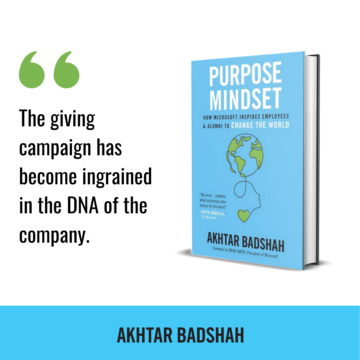What is Giving Compass?
We connect donors to learning resources and ways to support community-led solutions. Learn more about us.
As a global community, we have become reasonably adept at describing the need for change “out there” in the world. But we are not so good at addressing the change that also needs to happen within us. What shifts in our beliefs, attitudes, and assumptions are necessary to bring out the best in ourselves and to do good? I wrote Purpose Mindset to provide a framework for exploring the shifts that can take place within our inner selves, so that we can go on to help make powerful change in the world.

In the book, I tell the inside story of how Microsoft’s culture of purpose transformed the company and started a movement in the global community. I profile 24 individuals and their journey - from childhood to Microsoft and beyond - to purpose, in hopes of inspiring other companies and individuals to create positive change through purpose. As Bill Gates told me when I interviewed him for the book, as employees engage in community-centered philanthropy during the Microsoft Employee Giving Campaign (during the month of October employees solicit support for causes they want to support), “You get exposure and realize there are some really amazing causes out there; you see other people doing it; and you thank God, you know, that there’s a moral purpose more than just my normal job.” And it is that - moral purpose - that corporate philanthropy can give to an employee.
Without purpose, companies run the risk of burning out their employees. But with it, they provide a source of renewable energy that drives their employees - and humanity by extension - forward. As one employee told me, "After I volunteer, I have the feeling of wanting to take that back to my day job and mimic that experience, to replicate that energy and excitement at my job. The energy is still inside of you." When companies provide opportunities for their employees to explore purpose, they facilitate an overlay between personal values and values that have a broader community purpose mindset.
When purposeful energy is channeled toward community, we often see long-lasting, positive change. While Tazin Shadid was working at Microsoft, he found purpose while volunteering to run a healthcare program for people living in the urban slums of Dhaka, Bangladesh. He was so energized by this experience that he eventually left Microsoft and moved to Bangladesh to work full-time with Spreeha, a nonprofit that he founded. “What makes us different,” Shadid says, “is we are embedded in the community. Because of my skills from Microsoft, we take a human-centered approach, and that differentiates us from other organizations. We become part of the community, we become part of their family, and we build a very strong relationship based on trust. That is what drives our work.” In 2019, there was zero mortality rate in Spreeha’s service area in the Rayer Bazar slum.
Another Microsoft alum, John Wood, founded Room to Read in 1999 after a life-changing trip to Nepal and has since reached 20 million children. When Wood reflected on the lessons he learned at Microsoft, he said the most important learning was making sure local people are involved in everything (more than 90% of Room to Read’s workforce consists of local nationals). As Wood says, “We are not dropping into a community and treating them as passive aid recipients; communities co-invest in each project."
Shadid and Wood are not the only Microsoft alumni to take this lesson beyond the company and into their work. Giving Compass founders Tricia and Jeff Raikes were exposed to giving back through their early life experiences and upbringing. Under the guidance of Mary Gates (Bill Gates’ mother), their purpose blossomed and eventually they developed their own sense of philanthropy - reflected in the work they do at the Raikes Foundation. As Tricia Raikes states, “seek out the voices of those that bring lived experiences, as they are the experts, join with other like-minded partners, and be mindful when you can bridge to others who may not yet be allies in your work.” Building bridging networks is especially critical during these extraordinary times, as COVID-19 and the Movement for Black Lives have shone a bright light on the need to connect dollars to communities who have been least well-served and most affected by racial inequity.
Purpose Mindset is full of these stories. Stories of how Microsoft’s employee giving program has opened up new pathways to purpose for employees, who go on to advance change in the world, one community at a time. A profound sense of purpose is an aspirational goal that keeps us together and keeps us moving towards a better world, towards a better ideal. This book highlights principles that are meant to inspire all of us, especially in these very challenging times to discover purpose, build on it, and in doing so, continuously replenish our energy to do good.